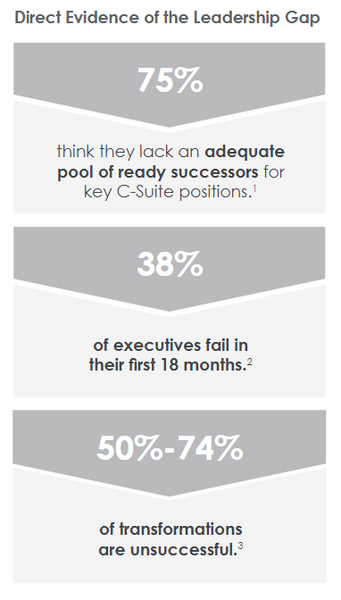ATD Blog
3 Reasons Leaders Fail
Tue Jun 26 2018

Organizations face an overwhelming leadership challenge. Thirty years ago, we could focus our development efforts on the elite few executives who topped the org chart, and throw in some high potentials for good measure. Today, though, demand for talent is massive and growing, far outstripping the resources organizations have to meet it. Just think about how deep and broad we have pushed decision making in the organization. There are numerous leaders to serve, and an infinite number of leadership moments. (I expanded more on these changing dynamics in my last post.)
At AchieveForum, we’ve found that the disconnect between resources and demands can help explain why organizations see such high leadership failure rates. Consider the following chart, which illustrates incredibly high new executive failure rates, transformation failure rates, and a lack of CEO confidence in bench strength.

So what’s going on? Why aren’t we getting better results? AchieveForum has identified three fundamental failure points in our industry.
Leadership development was built for the privileged few—senior leaders, high potentials, and maybe new managers. But today everyone needs leadership support for many situations. Limited resources have forced us to focus on the few individuals with the most leverage and on the transformational moments when they seemingly have the most impact. It’s the right way to deploy scarce resources, but it inevitably underserves the bulk of our employees in the many leadership moments they face.
Our default mindset has been to build professional leaders. We ask leaders to develop a huge skill set and adopt a wide range of behavior, on top of all their core job responsibilities, to prepare them in advance for all manner of leadership moments. Our employees are professionals who lead secondarily and must make decisions despite not having the time to master a sea of leadership skills. Not surprisingly, leader after leader with whom we speak tells us it all feels overwhelming and they can’t keep up. It’s simply too much to recall.
Leadership development paradigms are built for complicated environments, not complex ones. Complicated environments are like car engines; they seem impenetrable, but if you study them, you can figure out how they work and what they will do under all kinds of circumstances. In complex environments, though, we have all kinds of interconnection that makes the environment’s behavior unpredictable. It’s the butterfly effect—a butterfly flaps its wings in Singapore and we get a tornado in Kansas. When the environment is complicated, the past experience of other leaders—the people who inform our leadership lessons—is pretty reliable. In a complex business world like we confront today, past experience often leads us astray.
Are you experiencing these failure points or others in your organization?
At AchieveForum, we think of ourselves as a laboratory where we actively experiment with ideas that have the potential to change these dynamics. Our journey is documented online in the AchieveForum Leadership Lab. Please check it out, and feel free to share your thoughts in the comments.
